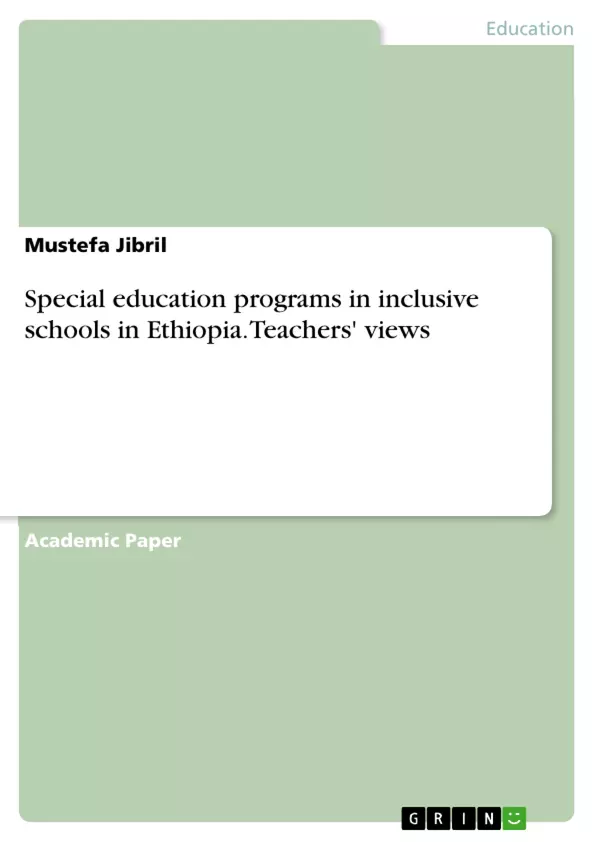The purpose of this study was to examine the special education programs used in inclusive schools in Ethiopia from the perspective of teachers. The study also aimed to determine whether statistically significant differences were in teachers' perceptions of their status, gender, teaching experience, and level of education. 615 question papers with 20 Likert statements are distributed to a random sample of general and special education teachers working in areas including Ethiopia. Eighty-five percent (n = 523) teachers completed and returned practical questions. Analysis of the data collected, using descriptive statistics and variance analyzes, has shown that teacher assessments of special educational programs used in their schools are generally acceptable. The results also show significant differences in the assessment of teachers in terms of their position and level of education.
Inhaltsverzeichnis (Table of Contents)
- Introduction
- Statement of purpose
- Methods
- Participants
- Measures
- Procedures
- Data Analysis
- Results
- Conclusion and Discussion
- References
Zielsetzung und Themenschwerpunkte (Objectives and Key Themes)
This study aims to investigate the effectiveness of special education programs implemented in inclusive schools in Ethiopia from the perspective of teachers. It also explores potential differences in teacher perceptions based on factors like their position, gender, teaching experience, and level of education.
- Evaluation of special education programs in inclusive schools in Ethiopia
- Teacher perceptions of special education programs
- Impact of teacher characteristics on program assessments
- Comparison of program effectiveness across different school settings
- Identification of potential challenges and strengths in the implementation of inclusive special education programs
Zusammenfassung der Kapitel (Chapter Summaries)
- Introduction: This chapter provides an overview of the importance of evaluating special education programs and highlights the challenges associated with educating students with disabilities in inclusive settings. It also discusses the need for comprehensive program assessment and the potential benefits of objective testing.
- Methods: This chapter details the research design and methodology used in the study. It describes the participants, measures, procedures, and data analysis techniques employed to collect and analyze information about teacher perceptions of special education programs.
- Results: This chapter presents the findings of the study, including descriptive statistics and variance analyses, which reveal the general acceptability of special education programs in Ethiopian schools from the perspective of teachers. It also explores statistically significant differences in teacher assessments based on their position and level of education.
Schlüsselwörter (Keywords)
The study focuses on the evaluation of special education programs in inclusive schools in Ethiopia. The main keywords include evaluation, programs, inclusive, special education, and perspectives. The research explores the perspectives of teachers working in these settings, considering factors such as their position, gender, teaching experience, and level of education.
Frequently Asked Questions
What was the primary goal of the study on inclusive schools in Ethiopia?
The study aimed to examine special education programs in Ethiopian inclusive schools from the perspective of teachers and identify factors influencing their assessments.
How many teachers participated in the research?
A total of 615 questionnaires were distributed, and 523 teachers (85%) completed and returned them for analysis.
Are special education programs in Ethiopia generally accepted by teachers?
Yes, the data analysis using descriptive statistics showed that teacher assessments of the programs used in their schools are generally acceptable.
Did the level of education affect how teachers viewed the programs?
Yes, the study found significant differences in teacher assessments based on their professional position and their level of education.
What methodology was used to collect data?
The researcher used a random sample and distributed question papers containing 20 Likert-scale statements to general and special education teachers.
- Quote paper
- Mustefa Jibril (Author), 2021, Special education programs in inclusive schools in Ethiopia. Teachers' views, Munich, GRIN Verlag, https://www.grin.com/document/1128002



